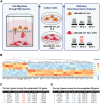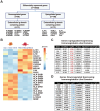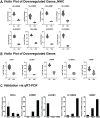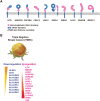Exploring novel immunotherapy biomarker candidates induced by cancer deformation
- PMID: 38743676
- PMCID: PMC11093347
- DOI: 10.1371/journal.pone.0303433
Exploring novel immunotherapy biomarker candidates induced by cancer deformation
Abstract
Triple-negative breast cancer (TNBC) demands urgent attention for the development of effective treatment strategies due to its aggressiveness and limited therapeutic options [1]. This research is primarily focused on identifying new biomarkers vital for immunotherapy, with the aim of developing tailored treatments specifically for TNBC, such as those targeting the PD-1/PD-L1 pathway. To achieve this, the study places a strong emphasis on investigating Ig genes, a characteristic of immune checkpoint inhibitors, particularly genes expressing Ig-like domains with altered expression levels induced by "cancer deformation," a condition associated with cancer malignancy. Human cells can express approximately 800 Ig family genes, yet only a few Ig genes, including PD-1 and PD-L1, have been developed into immunotherapy drugs thus far. Therefore, we investigated the Ig genes that were either upregulated or downregulated by the artificial metastatic environment in TNBC cell line. As a result, we confirmed the upregulation of approximately 13 Ig genes and validated them using qPCR. In summary, our study proposes an approach for identifying new biomarkers applicable to future immunotherapies aimed at addressing challenging cases of TNBC where conventional treatments fall short.
Copyright: © 2024 Kim et al. This is an open access article distributed under the terms of the Creative Commons Attribution License, which permits unrestricted use, distribution, and reproduction in any medium, provided the original author and source are credited.
Conflict of interest statement
The authors have declared that no competing interests exist.
Figures





Similar articles
-
ALG3 predicts poor prognosis and increases resistance to anti-PD-1 therapy through modulating PD-L1 N-link glycosylation in TNBC.Int Immunopharmacol. 2024 Oct 25;140:112875. doi: 10.1016/j.intimp.2024.112875. Epub 2024 Aug 9. Int Immunopharmacol. 2024. PMID: 39116492
-
Phosphatidylserine-targeting antibodies augment the anti-tumorigenic activity of anti-PD-1 therapy by enhancing immune activation and downregulating pro-oncogenic factors induced by T-cell checkpoint inhibition in murine triple-negative breast cancers.Breast Cancer Res. 2016 May 11;18(1):50. doi: 10.1186/s13058-016-0708-2. Breast Cancer Res. 2016. PMID: 27169467 Free PMC article.
-
Inhibitors of PD-1/PD-L1 and ERK1/2 impede the proliferation of receptor positive and triple-negative breast cancer cell lines.J Cancer Res Clin Oncol. 2021 Oct;147(10):2923-2933. doi: 10.1007/s00432-021-03694-4. Epub 2021 Jun 29. J Cancer Res Clin Oncol. 2021. PMID: 34185141 Free PMC article.
-
Determining Factors in the Therapeutic Success of Checkpoint Immunotherapies against PD-L1 in Breast Cancer: A Focus on Epithelial-Mesenchymal Transition Activation.J Immunol Res. 2021 Jan 7;2021:6668573. doi: 10.1155/2021/6668573. eCollection 2021. J Immunol Res. 2021. PMID: 33506060 Free PMC article. Review.
-
Immunotherapy in triple-negative breast cancer.Med Oncol. 2017 Dec 18;35(1):13. doi: 10.1007/s12032-017-1071-6. Med Oncol. 2017. PMID: 29255938 Review.
References
-
- Vasileiou M.; Papageorgiou S.; Nguyen N.P. Current Advancements and Future Perspectives of Immunotherapy in Breast Cancer Treatment. Immuno 2023, 3, 195–216, doi: 10.3390/immuno3020013 - DOI
MeSH terms
LinkOut - more resources
Full Text Sources
Research Materials

